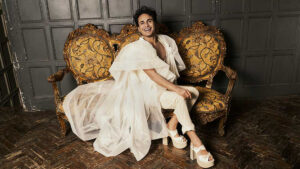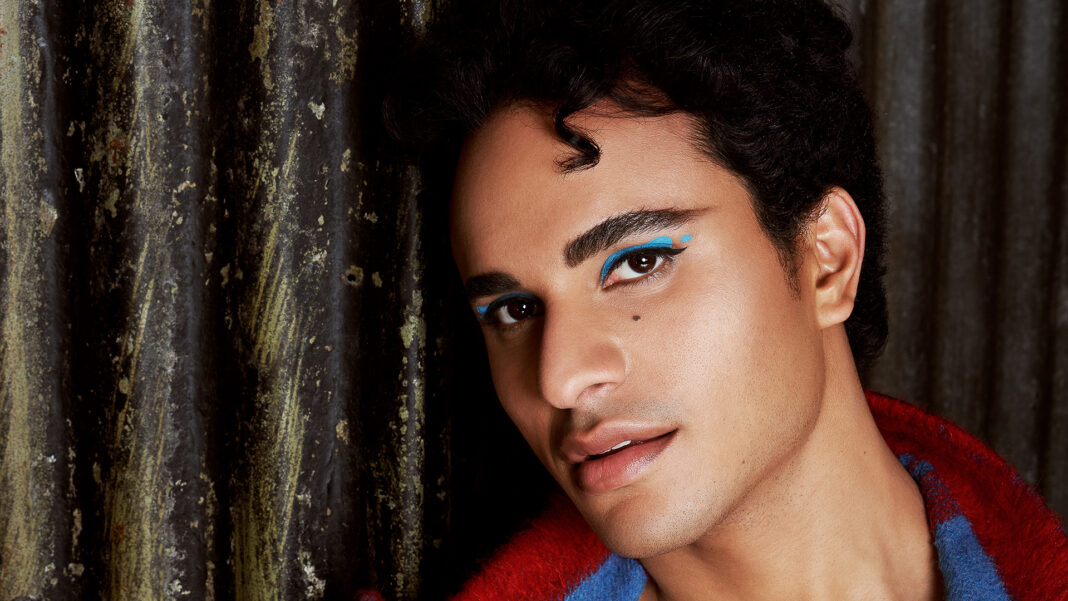THIS IS THE ELEVENTH OF OUR BEST OF 23 REVIEW OF INTERVIEWS: “I would push the doors as I have always have done with my life. I would like to push the boundaries. I have exactly the same voice and the same register as a female voice, a light lyric soprano. That’s what I am.” That’s how male soprano Samuel Mariño describes himself.
Mariño begins a series of concerts on Thursday, May 11th with the chamber music ensemble Camerata Pacifica. In their four concerts in Santa Barbara, Ventura, San Marino and Los Angeles, Mariño will perform Bach’s Non sa che sia dolore, BWV 209 and Pergolesi’s Salve Regina in C Minor.
Male sopranos are not common. You might be familiar with counter tenors like Anthony Roth Costanzo and Iestyn Davies. Perhaps you’ve seen the 1994 film Farinelli or Mark Rylance on stage in Farinelli and the King. Both told stories revolving around famed Italian castrato Carlo Broschi.
A true male soprano uses his chest voice, not his falsetto, to achieve the high vocal range required to be a soprano. Mariño’s voice only partially broke during puberty leaving him with a heavenly voice that led to a recording contract with Decca Classics and last year’s release of Sopranista.
I recently spoke with the Venezuela-born Mariño who was in Europe where he lives. We discussed the nature of his voice, the teacher who helped him find that voice and how much he brings to each and every performance. What follows are excerpts from our conversation that have been edited for length and clarity. To watch the full interview, please go to our YouTube channel.
Almost a year ago when Sopranista was coming out, you said on your Instagram account, “‘All my dreams will shine.’ A perfect line to describe how I feel as my album is being so joyously welcomed by each one of you.” What are the dreams that you have for yourself in the short term and in the long term? And I already know that you want to sing Lucia in Donizetti’s Lucia di Lammermoor. So let’s see what else you have up your sleeve.
Honestly my most sincere dream is to continue to give joy to the people. I really like to give joy to the people. That’s my goal in everything. I just want to entertain the people and I want to give something back, you know. I got so many things in my life. I have been very lucky. Of course, it’s a lot of hard work, but look at me. I come from Venezuela. I flew to France looking for a dream. I had €1,000 in my pocket and that’s all. Look at where I am today. So I have been very fortunate. I’m very lucky. And I feel like I just want to give something back. That’s my main dream and that’s what I want to do right now.
It’s great to give back, but you must also take care of yourself. How does music allow you to do that?

Music is like an instrument for me to heal myself and also to heal others. Music really transports me to maybe other dimensions. It’s very difficult for me to describe this, like places where I am floating, where I am flying, where I feel so many different things when I sing and when I even listen to music. I just want to bring the audience with me. Fly with me! Let’s go to all the places!
Or they take me also to those places with them. Because sometimes it’s not only myself to take them to travel. I suppose I travel with them even if I’m singing the same aria or something like that. I want the reaction of the people and taking it to another level. Especially when there is big silence after I finish something. They don’t clap. They don’t do anything, just staying silent. That’s quite a magical experience.
Your first album, Care pupille, was on Orfeo Records in 2020. You have Sopranista on Decca Classics. Have you had a homecoming concert in Venezuela?
Yes. Just before COVID I had two concerts in Venezuela. I was so nervous: it’s my home country, it’s my culture, it’s my people. Even if I moved very early to France – I have been living in Europe for ten years already – I cannot lie to them. I just cannot pretend anything. I just have to be myself. And I was so nervous. Really.
How did you feel at the end of the concert?
I felt empty, to be honest. I feel quite empty after every concert. But this one, I feel very empty emotionally because it gives me so many emotions. The audience were very happy that I was there. But after you have all this applause and sometimes all these people, I have all these music, all these notes. Then you come back home with, I don’t know, your partner or often alone. I come back to my hotel room and have all this energy, all this adrenaline. It’s just very difficult to come down.
The press release that Decca Classics put out at the time of your signing and announcing the album, they said “Mariño has been contacted by a number of musicologists eager for him to try his hands at arias written for male sopranos that had been neglected for centuries.” Has that process continued? What, if any, discoveries have you made about this forgotten material?
It is a very difficult process because very often the castrati arias have been tailored for the castrati. Like high up and low. The composer really takes advantage of every single capacity of the singer. I don’t have this capacity very often. Actually, I don’t have this capacity. So I just have to transform the aria into myself. I do have to put the music to Samuel Mariño, tailor the music to it for me. I’m not an easy job. Sometimes even I will say not healthy.
I say not healthy because sometimes it’s very often this repertoire of things go super high; no breathing. When you look at Cecilia Bartoli’s career, she released her first album dedicated to the Castrati [when] she was like 38, something like that. You need a solid technique to sing this kind of music. When I go to discover and people tell me, “Oh, let’s make this kind of thing,” I look at it very carefully because I have to keep my voice healthy. I would like to keep my instrument healthy. To sing carefully, even if castrato, is the main thing for me.
In the performances you’re going to be doing with Camerata Pacifica you’ll be doing works by Bach and Pergolesi – both baroque composers. That period of music showcased a lot of writing for male soprano. What did they know that you wish composers who followed them or even contemporary composers would know about what it is to write for a male soprano?
They just like write to the boys. I would like to work with a composer someday. I am very text person. I like to know what I am saying. That’s what I like about this Bach cantata because a lot of text is beautiful. The cantata is one of the few ones that he wrote in Italian. It’s beautiful, it’s super operatic and speaks very well. My voice is my personality. That’s what I would like to work with a composer. Something that can feed our personality and change our art together.
Countertenors seem to be embraced now in a way that they weren’t even 20 years ago in works by Nico Muhly and John Corigliano as just two examples. What do you think will need to happen for contemporary composers to start considering the male soprano?
I think that they will like it because we have all this expansion. We are not that many today. I mean it’s quite rare. I was actually in an opera, but it was canceled during COVID in Paris. It was called Madame White Snake, written for male soprano Michael Maniaci.
[Note: Madame White Snake, composed by Zhou Long with a libretto by Celine Lims Jacobs, was awarded the 2011 Pulitzer Prize for Music.]
How much of how you present yourself through fashion, hair and makeup is stuff that you are part of creating?
I do everything myself. Really. It’s really important for me because I don’t have this background, like many classical musicians, like my parents are musicians, so they play cello. My mother is a violin player. I don’t have that. I grew up listening Britney Spears and pop music and I was so amazed by it. When I look at these kind of shows, these pop artists still doing it today, Lady Gaga, for example, I get inspired by it. Why not bring that to opera? Of course, it’s a lot of work. Especially when it comes from one person.
People will never imagine all the work I have to do: looking online, being in contact with designers as well as working myself. I design, I draw myself my own outfits as well. Plus learning the music, traveling with the dog. But it’s an art form. As I said before, I like to give joy to the people and people have fun, look into my outfits and get excited about it. Classical audiences want to have the full show.
You grew up with all this pop music and then you got introduced to American lyric soprano Barbara Bonney, who I know was very important in your life. She told Bruce Duffie in a 1989 interview, when asked what advice she had for younger singers coming along, “Be really careful about your voice teachers.” What made her the right voice teacher for you and what did you learn from her that has most resonated with you and will guide you through the rest of your career?
I remember the first exercise that Barbara made me do. When I read to her it was like just singing and speaking. So I was like, [he demonstrates this vocally which can be seen in the video] “My name is Samuel and I like to drink earl grey with milk.” That’s how you start everything, just using my natural voice. After we listen to the real things of the voice, we can make your voice unique. Big singers [have] wonderful careers are great because they have a unique voice.
Someone like Renée Fleming, you hear romance, you hear jazzy background. Cecilia Bartolil you hear immediately silver color in her voice. Barbara really [taught] me how to find my own color because you have to be sellable. If you sing like everyone else you will be just like everyone else. She was right.
As a friend, as my musical mother, she also reminds me singing pays your bills. Even if it’s your passion, it pays your bills. So have a life, take care of constructing your own life and take care of your life. This is our passion. But we have to remember that it is our job as well.
Journalist Alexandra Coghlan in her review of Sopranista for Gramophone Magazine said “If Mariño is to have the mold-breaking career he clearly wants, then it has to be in the service of emotion and drama.” Last December you wrote on your Instagram account, “Pain is the hardest part of being a singer, apart from the technique, music, etc. It is very hard to come back to reality after the rollercoaster of emotions.” What role does your own life experience play in getting to where you need or want to be emotionally when you are performing and how much do you feel you have to learn to fully accomplish everything you want to with your performances?

That’s a very good question. You know, I believe there are two Samuels. There is that Samuel that you can see on a stage that maybe dresses fancy and everything. And there is a Samuel that is, at home, very shy. Super, super shy. Both Samuels have lived very deep experiences in their lives. So I 100% bring these emotions to stage.
I also live in the society. I am part of what is happening today in the world. I am aware of climate changes. I am conscious of climate changes. I am, like my millennial generation, suffering with anxiety because of climate change and these kind of things. So I don’t live in a bubble.
It is impossible for me to say something and not relate it to when I am living today or whatever I have lived in my past. My past is what I am today. I am what I am here. I am Samuel. You want to talk with me because of what happened before to me? Good and bad? I have a wonderful memory. That’s a good thing and a bad thing. I remember every single detail.
I bring that to the stage. It is not easy. It is very risky. I take a lot of risks because, as I say in that post, it’s very difficult to come back and say, that was part of your past. It’s very intense. But I want to do that because, well, first of all, I cannot do it another way. This is the only way I can do this. I have to be honest. And second of all, I want to make the audience feel with me. To have the pain or the joy with me. I want to make them accompany me. Like I am their friend. That I am with them now. That we are together because I am not the only one who lives in this kind of things. I am just like everyone. And I want to say to them we are together. We are living this together.
To see the full interview with Samuel Mariño, please go here.
Main Photo: Samuel Mariño (Courtesy Samuel Mariño and Camerata Pacifica)











